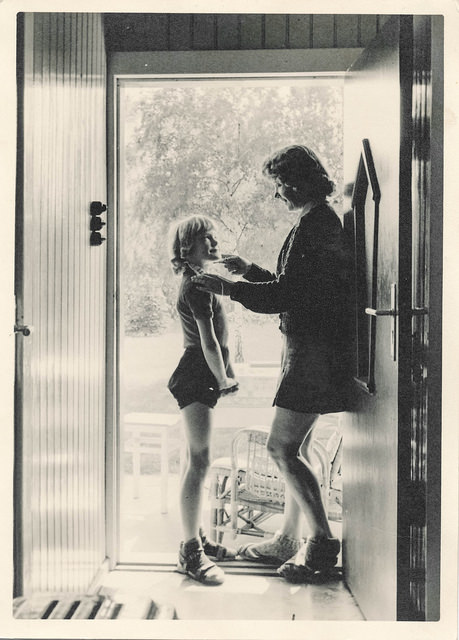There is nothing quite as complex as the relationship between a mother and a daughter.
I have always wanted things from my mom that I have never wanted from anyone else.
She’s impossibly generous—in emotions, in words and in her heart. My mom and I had turbulence. We had trauma. But on this particular day, I understood her.
I had lots of jobs growing up, and the one in our local off-license was the greatest eye opener in terms of understanding the cliquey and cute Northern Irish people I grew up with.
We had all sorts of eccentric figures throw their shapes in the door, mumbling and singing, in packs or alone. They always knew your name, your age, where you were last night, who you kissed last, and who you’d kiss next. Boundaries and privacy were impossible, but the off-centre celebrity of it made me happy and excited. I enjoyed their intoxication with the present moment and their complete lack of self-awareness. I was too full of that myself, to care about anything else but fun and distraction.
The day my mom arrived, I was tense, having just been dumped and replaced for a local beauty queen by the current “love of my life.” I barely acknowledged her and the overfamiliar and excessive greeting she gave me. My head was full of him. His credentials—tall, intelligent, sour-faced—amounted to an almost foreign cynicism that excited me. His ironic obsession with Bob Dylan completely bypassed me at the time. He always wore black and had never smoked a joint in his life. I wanted his derision, his faux culture, and carefully crafted vicious vocabulary, to rub off on me, if not extinguish me entirely. At 19 years old, absolute oblivion in another person is deeply attractive. It wears off eventually.
My mom was standing behind a local drunk, when he was begging me for a three-litre bottle of cider for free.
“I have only a pound. Can’t you give it to me? I might steal it. If I just take it, and you call the cops, I’ll be down the road at the corner waiting. I’m sorry.”
He was laced with shame, and doused in years of public hell. His face was a roadmap for what happens when your mum is absent, either in spirit, or in totality.
I watched her standing behind him.
She doesn’t drink. She has an effervescence to her face that makes the world quake when she laughs. Her eyes are like saucers, but crease into cheeky little lines when surprised into a smile. I remember stealing her perfume, wishing I could hold the world like that, in my lightening woman’s laughter.
The man was wringing his hands and begging. I was a student saving money to go back to Belfast on the following Monday. I needed the job to keep my hands out of the same wringing shape. In the darker evenings of my student digs, surrounded by illegible paper and over-friendly strangers, my hands were wringing to be noticed. My pain was self-inflicted though, so I wouldn’t budge for a drunk nobody.
I watched those happy crescents in her face, the ones she carried with her everyday smile, fall into stark moons. She fizzed with an understanding, beyond what I could interpret, for this man’s desperation.
“Here,” she said. “Seanin, give me a bottle of Strongbow.”
He stood back, half in perplexed shame and half in awe, as the little lady in the brightly coloured coat wrapped the treasured material in a blue bag and handed it over in the crook of her arm, like a newborn baby.
He ran off before she changed her mind.
As I watched her, watching him, dart into the August evening, the navy sky dropping into night, I remembered the times I’d shouted at her for not appreciating me. The many times I’d lied. The times I’d seen her, wringing her soft hands in pain and confusion, trembling with barely-suppressed indignation, as I turned on my heel into the same dropping darkness out of our kitchen door. Out of her life.
She was looking at him in the same way she probably looked at the space between us, the light in me receding from her reach. Her eyes were green orbs in a sad face.
She turned to me and said, “That’s a disease he has, you know. Poor man. I hope he sits up the back street. Some peace for him there.”
I felt myself peel back the layers of years. Her little self in a white bed, at the tender age of 23, holding me with my mop of black hair, my hands in fists. I pictured her in tears on a school morning, trying to tie my hair up, her work skirt crumpled, her face flushed. I pictured the sigh of acceptance as she put her phone down, after I’d failed to answer her call. Again.
I unfurled my tight, unforgiving, angry teenage fists behind the till, as she left, waving through the tall glass shop front, heading back home. She’d gotten what she needed—glimpse of my life.
She had only arrived in the shop to see me, to watch me become a woman neither she, nor I, could yet know. She had no other reason to be there.
I have no reason to be here without her.
All of our mothers hold space for us, and watch over us, as softly and silently as rain.
Their acceptance that we will leave them, we will misunderstand them, and may never see the brevity of their dreams for us, is starkly undermined by our every step away from them and into adult life.
I saw in my mom that day, the huge warmth and compassion she held for every single broken soul, for every heartache in every stranger, for knowing that in having me, her love is boundless.
I speak for all the mothers I know, who have passed me by as merely another caricature in a famously self-centred world. I speak for every daughter and son, who has never been certain how to really express their gratitude. I can’t even comprehend what terrible pains we cause them, simply for wishing more for ourselves than what they slogged and toiled to give us.
They walk the earth every day, simply to see us happy. To see us shine.
Mammy, I understand now.
~
Author: S. Friel
Image: simpleinsomnia/Flickr
Editor: Katarina Tavčar







Read 1 comment and reply